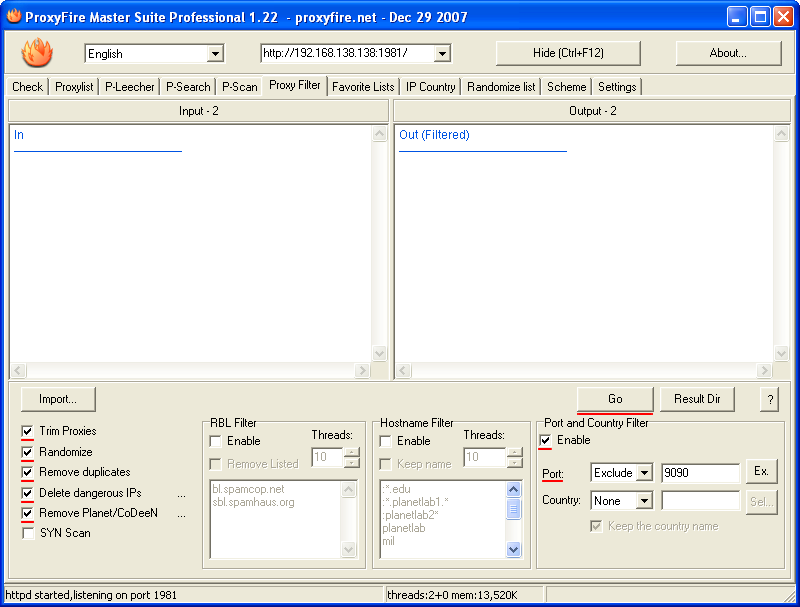Proxy mining FAQ
ANONYMITY
In this article, we'll look at the following ways of mining a proxy: Scanning, Surfing, Liching, Grubbing .
Also consider some methods of checking, sorting, filtering, defining a country, etc.
I will not describe here what a proxy server is, what they are for, you can read about it in our knowledge base .
Scanning ip addresses and then checking them (check) on the proxy
Ranges
Country ranges can be taken from the following sites:
- Http://www.proxyserverprivacy.com/ipaddress_range.php
- Http://www.ipaddresslocation.org/ip_ranges/get_ranges.php
- Http://www.find-ip-address.org/ip-country/
- Http://www.proxysecurity.com/ip-address-range.php
The whole range of ip addresses : 0.0.0.0-255.255.255.255
You can scan by country or by a certain range to specific ports.
Ports
We will scan to the main ports:
- Http: 80, 8080, 3128
- Socks4 and Socks5: 1080
The entire range of ports is 0-65535 .
There are a lot of other good ports on which there is a http proxy, for example: 81, 82, 6855, 8000, 8082, 8090, 8888, etc.
How do you know which ports to scan?
There are many ways, I will offer one of the simple and faithful.
We register on several proxy forums:
- Http://proxyfire.net/forum/
- Http://dcsproxy.com
- Http://forum.my-proxy.com
- Http://proxygod.com/forum/
We collect all the proxies that are posted there today, remove the duplicates (how to remove them, read below) and check the remaining (how to check the proxy - read below).
Proxyfire
Download Proxyfire Master Suite Free 1.22 or buy ProxyFire Master Suite Professional 1.22 ($ 29).
You can find a cracked version, Google to help.
Proxyfire is a whole laboratory for working with a proxy. You can throw out all the old software! You are no longer needed: scanners, grabbers, lichers, sherchers, checkers, bat-croiders, filters, duplicate-remotes, parsers of scanner reports and other garbage. Proxyfire unites all these utilities in one compact program, so we will work with it. Proxyfire does not require installation and it is very convenient to work with it on a dedicator. There is a hidden mode.
Tab: Settings

There is a window for editing proxy judges (Proxy Judges). Б.
They can be nudged, but you can make your own, reliable. Б.
To do this, you need to register several hosting and place the azenv.php script there:
<!DOCTYPE html PUBLIC "-//W3C//DTD XHTML 1.0 Transitional//EN" "http://www.w3.org/TR/xhtml1/DTD/xhtml1-transitional.dtd">
<html xmlns="http://www.w3.org/1999/xhtml" xml:lang="en" lang="en">
<head>
<title>AZ Environment variables 1.04</title>
</head>
<body>
<pre>
<?php
foreach ( $_SERVER as $header => $value ) {
if( strpos ( $header , 'REMOTE' )!== false || strpos ( $header , 'HTTP' )!== false || strpos ( $header , 'REQUEST' )!== false ) {
echo $header . ' = ' . $value . "\n" ;
}
}
?>
</pre>
</body>
</html>
In the program, specify the path to this file, click "Add" and write as in the screenshot above.
In fact, it's easier to do it manually, go to the folder with the program, open the file check.ini and write in it:
[0] Status = BAD Verify_http = 1 Verify_tunnel = 1 Verify_ssl = 0 Deleted = 0 Url = http: //jerry4.freehostia.com/judges/azenv.php Azenv = 1 Custom = 0 UrlCustom = http: //www.google.com/intl/zh-CN/ StrLevel1 = <title> Google StrLevel2 = <title> Google StrLevel3 = <title> Google StrIP = TunnelHost = www.google.com TunnelPort = 443 SSLUrl = https: //www.google.com/accounts/ManageAccount SSLKeyword = <title> Google Checked = 1 [1] Status = OK Verify_http = 1 Verify_tunnel = 1 Verify_ssl = 1 Deleted = 0 Url = http: //joshua2.freehostia.com/judges/azenv.php Azenv = 1 Custom = 0 UrlCustom = http: //www.google.com/intl/zh-CN/ StrLevel1 = <title> Google StrLevel2 = <title> Google StrLevel3 = <title> Google StrIP = TunnelHost = www.google.com TunnelPort = 443 SSLUrl = https: //www.google.com/accounts/ManageAccount SSLKeyword = <title> Google Checked = 1 [2] Status = OK Verify_http = 1 Verify_tunnel = 1 Verify_ssl = 1 Deleted = 0 Url = http: //leroy2.freehostia.com/judges/azenv.php Azenv = 1 Custom = 0 UrlCustom = http: //www.google.com/intl/zh-CN/ StrLevel1 = <title> Google StrLevel2 = <title> Google StrLevel3 = <title> Google StrIP = TunnelHost = www.google.com TunnelPort = 443 SSLUrl = https: //www.google.com/accounts/ManageAccount SSLKeyword = <title> Google Checked = 1
etc. Then save and reload the program, go to the Settings tab and see our paths to the proxy judges: 10 will be enough, suitable hosting from freehosthost.com
Tab: Proxy Filter
We all know that proxies can have different views, different port information is attributed to port 8080 and 808 (this is the same thing), periodically you need to remove duplicates, mix proxy lists, delete proxy with unnecessary ports, etc.
More modern and newfilled filter-parser than in Proxyfire I have not seen - it's a machine for working with proxy sheets.
In the window "In" you can shove any garbage, Proxyfire will pull a proxy out of it.

Tab: P-Scan
Tab "Scanner". Here you can enable "Auto Check", set the priority "Scan process Priority". Set the number of threads "Threads". If you have an Internet channel of 6 meters and more we put 3000 streams. Check the speed of the Internet connection here: http://2ip.ru
Timeout "Timeout (s)" set from 5 to 20. Choose the method of scanning "TCP" (the "SYN" method does not work now, as far as I know). Next, drive the ranges that will be scanned, the ranges should be of the form:
xxx.xxx.xxx.xxx xxx.xxx.xxx.xxx 
You can scan the ranges of a certain country, you can scan just your ranges, or you can create ranges from good proxies.
To do this, go to the "Make IP Ranges" tab, drive a good proxy into the "Input proxies here" window, set how to extend the ranges before and after "Up Expand" and "Down Expand" 1000 - the optimal number. You can weed out by country, click on the "Sel ..." button and select the countries. Next, click "Go" to see in the next window the generated ranges and below the ports.

We press "Copy to Scanner" and we are again in the "Scanner" tab.
Proxyfire scans to 1 port, the one that is the first registered in the list.
Tab: P-Search
A very effective way to find a proxy. If you need to quickly find working proxy - this is what you need.
Here everything is simple, choose the search engine: Google, Baidu, Yahoo! or MSN. Next, change the code, click "Edit" next to the search engine that interests us.
[search]
name=Google
engine=http://www.google.com/search?hl=en&lr=&as_epq=%KEYWORD%&start=%PAGE%
link_start=<li class=g>
link_end=</a>
Baidu
[search]
name=Baidu
engine=http://www.baidu.com/s?wd=%22%KEYWORD%%22&cl=3&pn=%PAGE%
link_start=<td class=f>
link_end=target="_blank"
Yahoo!
[search]
name=Yahoo!
engine=http://search.yahoo.com/search?p=%22%KEYWORD%%22&ei=UTF-8&b=%PAGE%
link_start=<a class=
link_end=</a>
Msn
[search]
name=MSN
engine=http://search.msn.com/results.aspx?q=%22%KEYWORD%%22&first=%PAGE%
link_start=<h3>
link_end=onmousedown
After selecting the search engine, set the number of threads "Serch Threads:" (in the free version it is limited to five!).
You can also enable the "Auto Check" proxy check after you reach the number of proxies you have found.
We press "Keywords" and write there a good proxy with the ports, and we will look for them + what is spread with them. Click "Go".

Tab: P-Leecher

In other words, grabber proxy. Here, too, everything is simple, set "Loop" and "Auto Check" if necessary. Specify the number of threads and the number of topics. Click on "Edit Forum List" to drive our proxy lists there.
Proxy sheets can easily be
Tab: Check
Proxy checker. We press the "Options ..." button, then we expose the threads "Threads:" I put 300 as something more and do not. Repeat "Retry:" 0
Next, we specify whether you need to run a proxy before the "Filter proxies in the Proxy Filter Tab before Check" check,
Show response time "Show response time"

There is one tricky button on the "SOCKS4 / 5" panel, clicking on it, two text files with separated Socks4 and Soksks proxy will open

Tab: Proxylist
If your computer accidentally shut down, you need to come here to pick up the proxy that you have scanned or searched for.





Comments
When commenting on, remember that the content and tone of your message can hurt the feelings of real people, show respect and tolerance to your interlocutors even if you do not share their opinion, your behavior in the conditions of freedom of expression and anonymity provided by the Internet, changes Not only virtual, but also the real world. All comments are hidden from the index, spam is controlled.